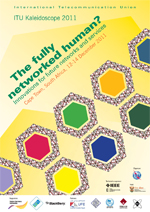|
 The fully networked human? − Innovations for future
networks and services − is the fourth in a series of
peer-reviewed academic conferences organized by ITU that brings together
a wide range of views from universities, industry and research
institutions of different fields. The aim of Kaleidoscope conferences is
to identify emerging developments in Information and Communication
Technologies (ICTs) at an early stage to generate successful products
and services through the development of international and open
standards.
The fully networked human? − Innovations for future
networks and services − is the fourth in a series of
peer-reviewed academic conferences organized by ITU that brings together
a wide range of views from universities, industry and research
institutions of different fields. The aim of Kaleidoscope conferences is
to identify emerging developments in Information and Communication
Technologies (ICTs) at an early stage to generate successful products
and services through the development of international and open
standards.
Kaleidoscope 2011 highlighted multidisciplinary aspects of future
ICTs including future services and applications demand as well as
social, economic and policy aspects of human-centric systems. In this
environment, the user is placed at the center, and virtualized networks,
other IT resources, services and applications are adaptively and
automatically configured to support the users in carrying out their
everyday life activities.
Besides many technical issues to be addressed, this also raises serious
questions about access to ICTs, privacy, interoperability and
sustainability. Future technologies should be designed to benefit
humans, not the other way round.
The fully networked human? − Innovations for future networks
and services called for original, academic papers
offering innovative and bold approaches in research and development to
integrate the real and the digital worlds.
Accepted papers were presented during the event, published in the
proceedings and in IEEE Xplore.
The authors of the award winning papers shared the prize fund of 10,000 USD.
First best paper: “Transmission Analysis of Digital TV Signals over a Radio-on-FSO Channel” by Chedlia Ben Naila, Kazuhiko Wakamori and Mitsuji Matsumoto (Waseda University, Japan); Katsutoshi Tsukamoto (Osaka University, Japan).
Second best paper: “SOA Driven Architectures for Service Creation through Enablers in an IMS Testbed” by Mosiuoa Tsietsi, Alfredo Terzoli, and George Wells (Rhodes University, South Africa).
Third best papers (ex aequo):
“A Hybrid MAC with Intelligent Sleep Scheduling for Wireless Sensor Networks” by Mohammad Arifuzzaman, Mohammad Shah Alam, and Mitsuji Matsumoto (Waseda University, Japan).
“Accessibility support for persons with disabilities by Total Conversation Service Mobility Management in Next Generation Networks” by Leo Lehmann (OFCOM, Switzerland).
|



